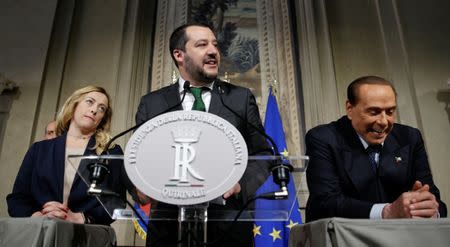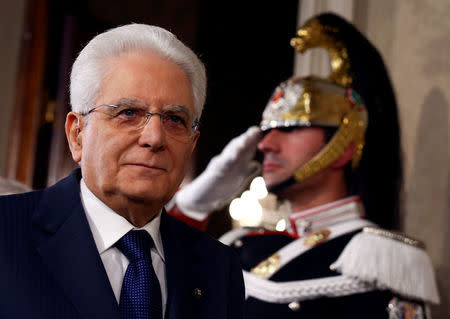Italy's League and 5-Star make 'significant steps' toward government deal
By Crispian Balmer and Gavin Jones ROME (Reuters) - The anti-establishment 5-Star Movement and far-right League said on Thursday they had made "significant steps" toward forming a government, as Italy looked to end nine weeks of political deadlock. The two groups, which are hostile to European Union budget restrictions and have made electoral pledges that would cost billions of euros to implement, finally entered into negotiations on Wednesday just as a swift return to the polls looked inevitable. "Significant steps forward have been made on the composition of the government and on the (nomination) of a prime minister," League leader Matteo Salvini and 5-Star chief Luigi Di Maio said in a joint statement after they met. They gave no indication of who might lead the administration or who could take charge of the key ministries. "I cannot disguise my joy and happiness that we can finally start solving Italy's problems," Di Maio said on Facebook. Italian President Sergio Mattarella, who has the final word over the make-up of any new administration, has given the two sides until Sunday to tell him about the outcome of their talks. "They asked us for time until Sunday, and on Sunday we expect an answer," a source at the president's office said. News that a deal was at hand pushed the gap between Italian benchmark bond yields and the safer German equivalent to its widest in seven weeks on concerns that the state accounts might take a hit. Italy's top share index fell 1 percent, the biggest decline of the day among Europe's main stock markets. "The prospect of having a government of two euroskeptic parties creates uncertainties... Investors may not trust such a government and fear that debt would rise," said IG Markets analyst Vincenzo Longo. Italy has been stuck in political limbo since an inconclusive March 4 election that saw a center-right bloc, including the anti-immigrant League, win the most seats, and the 5-Star emerge the largest single party by far. 5-Star had signaled for weeks it was ready to form a coalition with the League, but not with that party's electoral ally, former prime minister Silvio Berlusconi, whom it sees as a symbol of political corruption after years of scandals. Salvini had refused to abandon Berlusconi out of loyalty to the center-right bloc, but the 81-year-old billionaire businessman finally agreed to step aside voluntarily late on Wednesday, removing a major obstacle to an accord. Even so, a government deal faces various difficulties. EU CONFLICT 5-Star draws much of its support in the impoverished south while the League's electoral base is the wealthy north. While 5-Star wants to introduce generous welfare benefits, the League wants to slash taxes. One of the first things the two parties are likely to agree on will be to scrap a 2011 pension reform which raised the retirement age and required further hikes over time. Economists say repealing the law would cost 20 billion euros ($24 billion) a year, but opponents say it is unfair on ordinary Italians. Both parties also want to renegotiate the EU's fiscal rules to allow Italy to spend more. 5-Star has rowed back on a pledge to hold a referendum on Italy's membership of the euro zone, but the League still calls the euro a "flawed currency" and wants to exit it as soon as is politically feasible. A senior League senator, euroskeptic economist Alberto Bagnai, told reporters on Thursday that quitting the euro would not be a priority for the new government, but added: "European Monetary Union is destined to fail... It makes no sense." To hammer out a common government program, top League and 5-Star members met on Thursday afternoon. Afterward, 5-Star lawmaker Alfonso Bonafede said the meeting went "very well" and that they found a lot of common ground on many issues, including on tax cuts and pensions. There will probably be another meeting between the party delegations to discuss policies on Saturday, Bonafede said. Setting up a possible institutional clash in Italy, President Mattarella made clear on Thursday that he did not want to see any confrontation with Brussels. "To think that one can go it alone in Europe is knowingly deceptive in front of public opinion," Mattarella said in a pointedly pro-European speech at a conference on the state of the European Union in the central town of Fiesole. Referring to the euro, he said: "We have a currency that is capable of being a concrete anchor in international relations, a role that no national currency can perform." (Reporting by Crispian Balmer and Gavin Jones; Additional reporting by Massimiliano Di Giorgio and Steve Scherer in Rome and Danilo Masoni in Milan; Editing by Andrew Heavens and Hugh Lawson)




